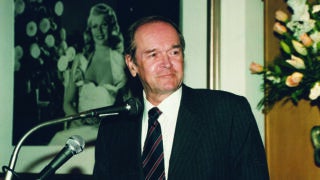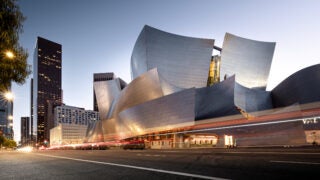Musician traces the roots of his electronic style — in jazz
USC Thornton alum Alfred Darlington, better known as Daedelus, collaborates on a new album with the ensemble Kneebody
https://youtu.be/vmWqP6dXj5o
A laptop and grid-based music controllers are not typical tools of jazz improvisation. The machines of electronic music, they rarely find their way into an improvising ensemble, but musician Alfred Darlington ’00, known professionally as Daedelus, has returned to his jazz roots with Kneedelus, a new album with acclaimed ensemble Kneebody.
The partnership has its beginnings at the Third Street Promenade, where Darlington and Kneebody saxophonist Ben Wendel busked in a jazz trio while as students at Santa Monica High School.
“We played to people who didn’t know any better — including us,” Darlington said. “We were basically playing for dinner money. It was all in dollar bills.”
Since then, Darlington has released more than 15 genre-defying albums offering a template for many of the hybrid forms of electronic music now being recorded.
Kneebody, which formed in 2001 while Wendel, keyboardist Adam Benjamin, trumpeter Shane Endsley, electric bassist Kaveh Rastegar and drummer Nate Wood were students at the Eastman School of Music and the California Institute of the Arts, earned a Grammy nomination for its 2009 album, Twelve Songs of Charles Ives, with singer Theo Bleckmann.
A firm foundation
What they share, in addition to an aesthetic of ardent creative experimentation, is a solid foundation in music. Darlington can trace his roots to the Jazz Studies program at the USC Thornton School of Music. It was while studying the double bass that he was first exposed to electronic music.
“I was very much interested in the kind of music that involved synthesizers and tape effects and more complicated synthesis, but I had no idea how it worked,” he said. “It was at USC where I got my feet wet and learned how possible it was — that it wasn’t some impossible technique that couldn’t be learned unless you were really moneyed or at some European institution. That set off a light bulb about cross-pollinating a lot of things.”
He eventually switched to a Bachelor of Arts in music to focus on electronic music.
“I literally maxed out the coursework available to me in modular synthesis and samplers,” he said.
The training pays off
The jazz training he received continued to inform his creative decisions after graduation, but he initially tried to distance himself from his studies.
Why do parallel fourths scare me to this day?
Alfred Darlington
“First, it was something I wanted to run away from,” Darlington said. “I was really scared of the shadows it cast across my work. It just felt really present. Not only the jazz stuff, but also all of the music theory I had been learning as required coursework — even the rules of Gregorian four-part harmony. Like, why do I need to know this and why do parallel fourths scare me to this day?”
He eventually saw the benefits of his training.
“I later realized how much of an advantage it gives me,” he said. “It’s enormous. Not only in music theory and knowledge, the ability to read charts and more, but also the ability to speak in a kind of communal language that allows me to be some places that other digital performers and other jazz performers can’t go. It’s exceptional in that regard.”
Since first trading in his upright bass for samplers, Darlington has finally arrived at a time when the technology seems capable of providing him the ability to manipulate electronic music with a fluidity that is on par with the jazz musicians he once studied.
After spending so many years in electronic music, performing with Wendel and Kneebody in a jazz setting while armed with a laptop and controllers has proven to be a very satisfying return to form.
“Especially in electronics, it’s a fast-moving world, and I think people’s attention spans are, for good reason, very short,” he said. “It demands that the music is moving and changing at a breakneck speed.
“The fact that Kneebody is in the same continuum as Miles Davis, Benny Goodman and Jelly Roll Morton — no matter how radically different their sounds and their aims and goals — is both terrifying and also amazing in their ability to communicate something bigger,” he said. “History is on their side rather than against them, at times. So to be able to not feel the pressure of the now-ness of everything, that has been huge for me.”
Daedelus and Kneebody will perform at the Echoplex in Echo Park on Thursday.



